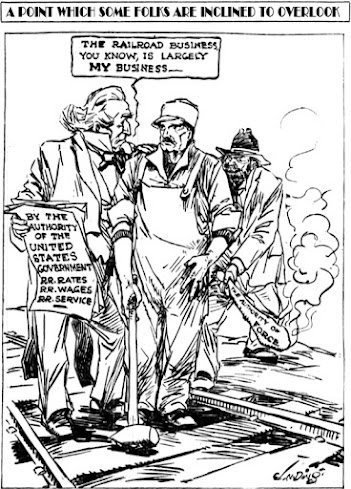(or, Whose Side Are You On?)
This week's Graphical History Tour focuses on one issue and one cartoonist in August of 1922.
 |
| "Great Game! Who's Ahead" by J.N. "Ding" Darling in Des Moines Register, Aug. 5, 1922 |
The strikes by railroad and coal mine unions, now several months old, dominated the news in the summer of 1922, so it only makes sense that Darling would return to the topic again and again. In several of these cartoons, he seems to hold both management and the unions equally culpable in their inability to reach a settlement.
 |
| "Someday Maybe When Sam Gets to Be a Big Boy..." by Darling in Des Moines Register, Aug. 9, 1922 |
In one cartoon after another, it's Uncle Sam and/or John Q. Public who are ruthlessly victimized by labor and management.
 |
| "A Lot They Care for Fairness" by Darling in Des Moines Register, August 11, 1922 |
Darling, it must be noted, was primarily sympathetic to the Republican party, so it is remarkable that he would return over and over to holding labor and management both accountable for the protracted labor dispute.
 |
| "New Method" by Darling in Des Moines Register, Aug. 13, 1922 |
This series of cartoons escalates the brutality of labor and management.
 |
| "They'll Save a Lot of Time..." by Darling in New York Tribune, Aug. 6, 1922 |
Here Darling proposes that the federal government step in to operate the coal mines. Can you imagine Republicans of today proposing that the government run the coal (or any other major) industry?
 |
| "A Point Which Some Folks Are Inclined to Overlook" by Darling in Des Moines Register, Aug. 15, 1922 |
The federal government had taken over running of the railroads during World War I, and returning control to private industry had been a prominent issue for Republicans once armistice had been declared. Darling had been among them, but here he seems to suggest that Uncle Sam might need to step back in, setting rates, wages and service "by authority of the United States government."
 |
| "And Still Boys Will Grow Up..." by Darling in Des Moines Register, Aug. 14, 1922 |
Although Darling hadn't been a fan of Candidate Warren Harding during the 1920 presidential campaign, he approved of President Harding's "polite invitation to settle the strike for the good of the country." Darling offered his full support should Harding pick up the presidential Big Stick, as Teddy Roosevelt had done, to force labor and management to come to an agreement.
 |
| "A Case for Careful Deliberation" by Darling in Des Moines Register, Aug. 19, 1922 |
By the same token, Darling displayed his disappointment in the president as normalcy-minded Mr. Harding spoke softly, turning the problem of the railroad strike over to the vacationing Congress.
 |
| "We Still Can't See Anything the Matter with It" by Darling in New York Tribune, Aug. 12, 1922 |
Darling may have faulted both labor and management at the start of the mine and railway worker strikes, but he was, after all, a Republican at heart. Eventually, he found the unions more to blame than the mine and railway owners. In this cartoon, United Mine Workers of America President John L. Lewis shuns President Harding's offer of a splendid repast, "six months of everything they asked for," to the escalating bewilderment of John Q. Public.
What? You mean Lewis wasn't happy to postpone those drastic wage cuts until February? Some people are just impossible to please.
 |
| "When the Eight-Hour Day Representative..." by Darling in New York Tribune, Aug. 22, 1922 |
In the case of the railway workers, their issue wasn't only the wage cuts, but they also wanted to limit their workday to eight hours. The idea of an eight-hour workday was hardly new in 1922, but Iowan Darling mocked the concept in a cartoon sure to please his readers in farm country.
But Darling was not quite finished pointing the finger of blame.
 |
| "The Secretary Has Another Think Coming" by Darling in Des Moines Register, Aug. 31, 1922 |
In case the print in Uncle Sam's newspaper is too tiny for your eyeballs, he's showing Labor Secretary James Davis a list of men arrested or under investigation for recent violent actions by labor activists, and others taken into custody in a "raid on Red headquarters." All of them have non-Anglo-Saxon names, e.g., Popovich, Aleesio, Pzopowlosky, Martinez, Nebolskowitz, Kilsudsky, Heldieblower, Swartztrauber, and Nickleo.
Darling may not have been aware that Davis was an immigrant himself (from Wales, when he was 8 years old). As Secretary of Labor, however, he was in charge of the federal department overseeing immigration policy. The Border Patrol was established under his watch, and whatever his thoughts on the subject in August of 1922, his legacy would be further limits on immigration.
No comments:
Post a Comment